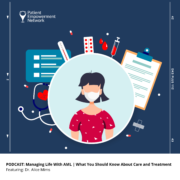CLL & Relapse: A Look at Available Treatment Options
CLL & Relapse: A Look at Available Treatment Options from Patient Empowerment Network on Vimeo.
What chronic lymphocytic leukemia (CLL) treatment options are available for relapsed patients? Expert Dr. Ryan Jacobs explains options for patients in relapse and for those seeking additional treatments.
Dr. Ryan Jacobs is a hematologist/oncologist specializing in Chronic Lymphocytic Leukemia from Levine Cancer Institute. Learn more about Dr. Jacobs.
Download Resource Guide | Descargar Guía en Español
Related Programs:

|

|

|
Transcript:
Lisa Hatfield:
What treatments do you think are the most beneficial for patients whose CLL has relapsed? What are the poor prognostic indicators for CLL? And along the same lines, what are the high-risk genetic markers for CLL?
Dr. Ryan Jacobs:
It’s a little more complicated discussion in the first-line setting because both are options. At this point in time, we haven’t been…at least those that are, I would say, staying up to date on the CLL data, we have not been using chemotherapy for a long time. So most of the relapsed patients will have seen either one of the BTK inhibitors or venetoclax (Venclexta). And so what we do in the second-line setting is just use the other option that they haven’t seen. The data tells us, when you look at what treatments are being prescribed, most patients are going on BTK inhibitors, and they have been around longer than venetoclax in general. So for a lot of patients, that relapsed treatment is going to be venetoclax. Because that has the best data in terms of treating patients that have progressed on a BTK inhibitor like ibrutinib (Imbruvica) or acalabrutinib (Calquence) or zanubrutinib (Brukinsa).
In the near future, we’ll have pirtobrutinib (Jaypirca) and so maybe, maybe some will get that drug before venetoclax, and that’s probably okay. And so we’ll have that additional option. The complicated patients, and I’ve alluded to this, or what do we do after BTK and Bcl-2? What are we left with? I mentioned PI3 kinase, that’s not a great option. There’s still stem cell transplant out there for young patients that are running out of options. Clinical trial is really what I would like to emphasize there. If you’re a patient that can get to a high volume referral cancer center with a CLL specialist, I would do that if you have seen BTK inhibitors and venetoclax and are looking for other options.










